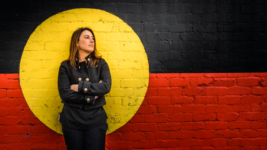Senate Motion Requires Attorney General to Report on Deaths in Custody

Senator Lidia Thorpe successfully passed a motion last Thursday requiring the Australian attorney general to report on deaths in custody in a quarterly manner, with the aim of coming to a more precise understanding of these deaths that are occurring in the custody of police or corrections, as well as providing a level of transparency around them.
The number of Aboriginal and Torres Strait Islander prisoners who have died in the custody of Australian police and corrective services since the Royal Commission into Aboriginal Deaths in Custody handed down its final report containing 339 recommendations on 15 April 1991, currently comprises of 573 fatalities.
In response to Thorpe’s motion, Labor finance minister Katy Gallagher told the Senate that the Albanese government would not be voting in favour of it, as, while recognising that Indigenous incarceration and custodial death rates are “unacceptable”, the government last year had rolled out the “national real-time death in custody dashboard” and that would suffice.
Gallagher added that the issues of law enforcement and imprisonment are, for the most part, the charge of the states and territories and hence, this is not a matter that the nation’s chief lawmaker should be responsible for.
However, Thorpe had already secured an alliance of crossbenchers to back her long-term focus on getting federal Labor to actively approach the issue of First Nations deaths in custody and forced child removals in March, and when it came to vote on the fresh task for the Attorney General’s Department, the rest of the Senate all voted in favour of it.
AG quarterly reports
“We know that horrific things are happening in prisons, but these human rights abuses are kept hidden from public view,” said Senator Thorpe in a statement, on the day following the motion being passed. “People are dying preventable deaths, women are being denied proper care during pregnancy and childbirth and self-harm is widespread.”
“We need a strong, decisive federal response and nation leadership on these critical issues,” the Gunnai, Gunditjmara and Djab Wurrung Independent Victorian Senator continued. “Transparent reporting and oversight is a crucial part of this.”
So, from now on, the AG, currently Mark Dreyfus, will be responsible for preparing reports at the end of each quarter in regard to deaths in custody. These must include the number of deaths, the breakdown of age groups and causes of death, along with ongoing coronial inquests, the number of incidents of self-harm in correctional centres and miscarriages and still births that happen in prison.
Dreyfus, and then Indigenous affairs minister Linda Burney and Senator Patrick Dodson, announced the roll out of the real-time deaths in custody dashboard, which currently appears on the Australian Institute of Criminology website, in June 2023. Although this has led to criticisms that being able to count the dead precisely is perhaps not sufficient solution in preventing ongoing deaths.
“Yesterday, Labor senators were alone in opposing this motion,” Thorpe further made clear. “The entire crossbench and the Coalition are united on this. We want to see the federal government finally start taking responsibility for what is happening in this country’s criminal legal system.”
Exposing multiple prison crises
This theme of the federal government intervening in the criminal justice system has been ongoing over the course of the current parliament with Thorpe and the Greens having raised various aspects of state law enforcement and corrections that are in crisis and require the attention of the federal government, as for decades these issues have only been increasing under state level governance.
“Labor will make the excuse that these are just ‘state issues’, but we should not accept this weak cop-out,” Thorpe added on Friday. “The attorney general meets regularly with the states and territories, he can and should require them to provide this data.”
“This is not about a few bad jurisdictions or a few bad facilities. This is a national human rights and public health crisis. It needs national attention.”
The senator’s motion also has a focus on pregnancy issues following the discovery of evidence of a unreported pre-term miscarriage being detected at western Sydney’s Dillwynia women’s prison and a recent Victorian custodial report found that women inmates are being handcuffed whilst giving birth, while in 2018, an Aboriginal woman was left alone to give birth in a WA gaol.
As UTS Jumbunna Institute senior researcher Paddy Gibson recently revealed, the crisis in incarceration has increased under Labor, which has seen Indigenous adults accounting for 31 percent of the entire adult prisoner population in the first quarter of 2022 to 35 percent that same quarter this year, whilst First Nations peoples only account for 3.8 percent of the entire continent’s populace.
Gibson further revealed that 59 percent of the child prisoner population is currently made up of First Nations kids, and they’re more likely to get locked up than their non-Indigenous counterparts. And the Greens recently secured a federal inquiry into the nation’s youth justice system.
Disappearing commitment
The recent vote has clearly revealed that despite the Albanese government taking office on the promise to deliver real reforms for Indigenous communities, especially via its failed Voice to Parliament referendum in October last year, it has today given up on the cause of progressing real improvements for Indigenous peoples.
“It was shameful that Labor voted against this motion. I was particularly disappointed to see the new minister for Indigenous Australians vote against it,” Thorpe remarked last Friday, after the success of her motion.
However, the senator expressed doubts as to whether the Labor government will actually produce the reports – with the first one being due on 10 October – but she stressed that she would not be letting the government get away with shirking on the issue.
“I am calling on the prime minister, the Indigenous Australians minister, the attorney general and the health minister to start leading positive change on these important issues,” Thorpe said in conclusion.







